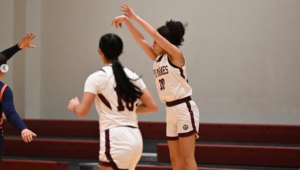THE POSITIVE EFFECT OF HIGH SCHOOL ATHLETICS ON BLACK ATHLETES – BY BERNIE ANDERSON, HOLY NAMES ACADEMY (’26)
 The effect high school sports have on Black athletes is more than one might think. While many students love and enjoy their high school sports team, this connection is more deeply rooted in Black athletes at predominantly white institutions (PWI). Many Black students come to school every day and do not see representation in themselves as they walk the halls. For the schools that do not have a strong Black community, sports can be a grounding point for many athletes searching for a cultural connection.
The effect high school sports have on Black athletes is more than one might think. While many students love and enjoy their high school sports team, this connection is more deeply rooted in Black athletes at predominantly white institutions (PWI). Many Black students come to school every day and do not see representation in themselves as they walk the halls. For the schools that do not have a strong Black community, sports can be a grounding point for many athletes searching for a cultural connection. Being a part of a close-knit sports team can give Black students a safe space to express themselves that might not otherwise be available to them while attending a PWI. Three-sport varsity athlete and senior Emia Beaver said, “Being a Black student at a PWI, my cultural representation is limited, but being a part of [her high school’s] sports programs has given me the opportunity to be a part of a close-knit community where I’m supported and appreciated for me and my talent.” Many people do not realize just how hard it is to operate day-to-day as a Black student in a predominantly white institution when these students are often the only Black person in the room. Having an outlet where they can bond closely with their teammates through a common interest and be appreciated themselves is key while thriving inside and outside of sports. Sports can also help Black athletes connect with people outside of their race on a deeper level. Maya Russell, a junior and three-year varsity soccer player said, “It gives me an opportunity to connect with more people across races and within my own race in an environment where we are working towards the same goal.” Athletics can be a universally bonding experience because teammates see each other through the highs and lows yet still stay united, creating a family-like bond. This bond through a struggle can be seen in many historically oppressed minorities, such as African Americans, and can be replicated on sports teams throughout the wins and losses of a season.
Emily McKenzie, a school counselor at Holy Names Academy, adds professional input on the topic of classroom environments based on her experience counseling high schoolers and her understanding of diverse experiences. From her countless conversations with students, she says “I think that Black students especially are often put in spaces in schools that are not built for them. Education as a whole was first designed for white males, and we still see now the ways that education nationally prioritizes certain viewpoints. When you go through every single day learning a lot of white history and reading books from the white perspective, you can start to feel your own personality stripped away.” McKenzie illustrates how these norms of the American school systems can suppress the experiences of Black students, leading many to feel unwelcome in their own high school halls.
Many Black students also use sports as a way to show their personality where it may not otherwise be welcome. Amiah Armstead, a sophomore and multi-sport athlete, said, “At some PWIs you are nothing more than the color of your skin and yet another statistic. However, for me, sports are where I can create an identity for myself.” High school is a pivotal point in a teenager’s life as they transition to young adulthood because it is the environment where they start to figure out who they are and how they want to operate in the world. It is hard for Black students to grow into their full selves when they do not feel welcome in their own high school halls. Aliyah Alexander, a senior varsity athlete and team manager, says that sports “give me a chance to put myself out there and have people see who I am outside of the classroom.” Aliyah helps illustrate the importance of out-of-school activities to the formation of self and how a person presents to others. Having an outlet such as a sports team where teenagers can practice social skills and be free to grow in themselves is incredibly important. Since many Black students are not free to be themselves in the classroom, this puts an extra emphasis on the high school sports experience.
In conclusion, the impact of sports on Black students at Primarily White Institutions extends far beyond what many people realize, serving not just as an extracurricular activity but as a vital source of belonging and identity. For Black students who may not feel comfortable or fully accepted in the classroom, sports can create a much-needed home away from home, providing a space where they can freely express themselves, build meaningful connections, and develop a sense of belonging. This safe haven allows them to thrive and grow in ways that may not be possible in more traditional academic settings, making the role of sports an essential factor in Black students’ overall high school experience.




